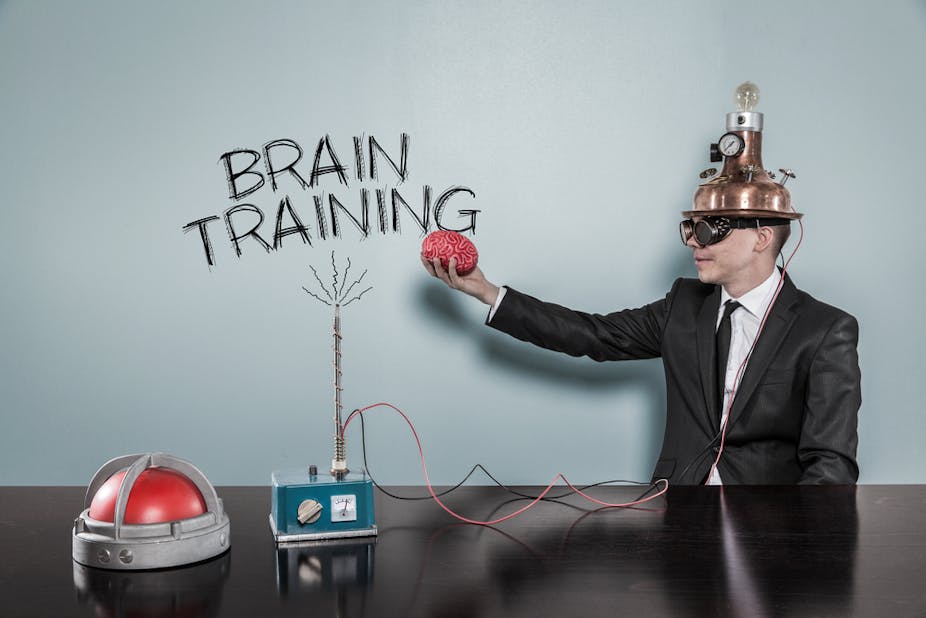You’ve probably heard of “brain training exercises” – puzzles, tasks and drills which claim to keep you mentally agile. Maybe, especially if you’re an older person, you’ve even bought the book, or the app, in the hope of staving off mental decline. The idea of brain training has widespread currency, but is that due to science, or empty marketing?
Now a major new review, published in Psychology in the Public Interest, sets out to systematically examine the evidence for brain training. The results should give you pause before spending any of your time and money on brain training, but they also highlight what happens when research and commerce become entangled.
The review team, led by Dan Simons of the University of Illinois, set out to inspect all the literature which brain training companies cited in their promotional material – in effect, taking them at their word, with the rationale that the best evidence in support of brain training exercises would be that cited by the companies promoting them.
But the CEO says it works …
A major finding of the review is the poverty of the supporting evidence for these supposedly scientific exercises. Simons’ team found that half of the brain training companies that promoted their products as being scientifically validated didn’t cite any peer-reviewed journal articles, relying instead on things like testimonials from scientists (including the company founders). Of the companies which did cite evidence for brain training, many cited general research on neuroplasticity, but nothing directly relevant to the effectiveness of what they promote.
The key issue for claims around brain training is that practising these exercises will help you in general, or on unrelated tasks. Nobody doubts that practising a crossword will help you get better at crosswords, but will it improve your memory, your IQ or your ability to skim-read email? Such effects are called transfer effects, and so-called “far transfer” (transfer to a very different task than that trained) is the ultimate goal of brain training studies. What we know about transfer effect is reviewed in Simons’ paper.

As well as trawling the company websites, the reviewers inspected a list provided by an industry group Cognitive Training Data of some 132 scientific papers claiming to support the efficacy of brain training. Of these, 106 reported new data (rather than being reviews themselves). Of those 106, 71 used a proper control group, so that the effects of the brain training could be isolated. Of those 71, only 49 had a so-called “active control” group, in which the control participants actually did something rather than being ignored by the the researchers. (An active control is important if you want to distinguish the benefit of your treatment from the benefits of expectation or responding to researchers’ attentions.) Of these 49, about half of the results came from just six studies.
Overall, the reviewers conclude, no study which is cited in support of brain training products meets the gold standard for best research practises, and few even approached the standard of a good randomised control trial (although note their cut off for considering papers missed this paper from late last year which showed the benefits of online brain training exercises, including improvements in everyday tasks, such as shopping, cooking and managing home finances.
Promotion is premature
The implications, they argue, are that claims for general benefits of brain training are premature. There’s excellent evidence for benefits of training specific to the task trained on, they conclude, but less evidence for enhancement on closely related tasks and little evidence that brain training enhances performance on distantly related tasks or everyday cognitive performance.
The flaws in the studies supporting the benefits of brain training aren’t unique to the study of brain training. Good research is hard and all studies have flaws. Assembling convincing evidence for a treatment takes years, with evidence required from multiple studies and from different types of studies. Indeed, it may yet be that some kind of cognitive training can be shown to have the general benefits that are hoped for from existing brain training exercises. What this review shows is not that brain training can’t work, merely that the promotion of brain training exercises is – at the very least – premature based on the current scientific evidence.
Yet in a 2014 survey of US adults, more than 50% had heard of brain training exercises and showed some credence to their performance-enhancing powers. Even the name “brain training”, the authors of the review admit, is a concession to marketing. In reality, these games are usually developed without anyone measuring brain activity or brain changes directly.

The widespread currency of brain training isn’t because of overwhelming evidence of benefits from neuroscience and psychological science, as the review shows, but it does rely on the appearance of being scientifically supported. The billion-dollar market in brain training is parasitic on the credibility of neuroscience and psychology. It also taps into our lazy desire to address complex problems with simple, purchasable, solutions (something written about at length by Ben Goldacre in his book Bad Science).
The Simons review ends with recommendations for researchers into brain training, and for journalists reporting on the topic. My favourite was their emphasis that any treatment needs to be considered for its costs, as well as its benefits. By this standard there is no commercial brain training product which has been shown to have greater benefits than something you can do for free.
Also important is the opportunity cost: what could you be doing in the time you invest in brain training? The reviewers deliberately decided to focus on brain training, so they didn’t cover the proven and widespread benefits of exercise for mental function. I’m happy to tell you now that a brisk walk round the park with a friend is not only free, and not only more fun, but has better scientific support for its cognitive-enhancing powers than all the brain training products which are commercially available.

